Wall to wall spoilers. See the film. Do it. Now.
Director: Billy Wilder
Screenplay: Billy Wilder, Lesser Samuels, and Walter Newman
Starring: Kirk Douglas, Jan Sterling, Bob Arthur, Porter Hall, Frank Cade, Richard Benedict, Ray Real, and Frank Jaquet
Images from the 2007 Criterion Collection release.
For me, Billy Wilder's insanely caustic Ace in the Hole is one of the greatest films ever made. At the time it was released, it was a box office flop and most critics were none too happy with its scathing attacks on journalism. I suspect people were turned off by how closely Wilder took aim at the audience itself, completely exposing the idiocy of the American populace and equating them to sadistic vultures. While the film may not look it on the surface, it is one of the great film noirs out there. The setting is actually not unfamiliar ground for noir, since movies like Out of the Past and On Dangerous Ground do bring themselves to the open spaces of the countryside. Ace in the Hole certainly has its share of noir-ish moments as well, but what I like about it the most is how it manages to completely ridicule the media circus and the society out of which it was born. That it was made during the height of the Hays Code is even more astounding. Kirk Douglas really does give one of the great performances out there, and Chuck Tatum does belong on a list of deeply flawed, yet fascinating characters that includes Fred C. Dobbs, Hank Quinlan, Dixon Steele, Jim Wilson, and more.
The film tells the story of Chuck Tatum, an out of work newspaperman looking for a big story amidst the vast emptiness of New Mexico, hoping that it will shoot him straight to the top. He stumbles upon Leo Minosa, who's trapped under an Indian burial ground and exploits the situation into a full blown, 7-day rescue operation. The film is one of the finest indictments of the media circus and the blood-thirsty unwashed masses.
Jim Emerson of the Chicago Sun-Times has an "Opening Shots Project" at his blog. His belief is that all great movies can be understood by examining their opening shots in detail. It is like the first paragraph of a book that sets the stage for what's to come, thematically and literally. I think I'll give it a shot with Ace in the Hole:
Here, we are introduced to Chuck Tatum riding in a car that's being towed while reading a newspaper. From this, we can see that Tatum is an opportunist. He does not create something novel so much as ride on the coattails of others and feed off of them. The shot implies he is a parasite/rodent/pest, and the film will later show that this is something present in the great American masses as a whole.
Chuck Tatum: Newspaperman, Treasure Seeker, Opportunist
I do think Chuck Tatum is a parasite, but it would be a mistake to lump him in the same pile as the rest. He's in another class of parasites, the king of them all, if you will. Whereas the readers of his articles are essentially moronic, Chuck is intelligent, calculating, manipulative, and above all, he knows he's a parasite. We see him ask Mr. Boot for a job, prostituting his services for a price.
He uses others, and gets used himself. Tatum is also self-destructive, an alcoholic who doesn't even need a drink to send him over the edge. He is self-catalytic, auto-igniting his own inevitable destruction as he clamors to the top. The image of him lighting a match on the typewriter exemplifies this, and also shows that he is an impetus for the media circus, with the typewriter as his spark.
Mr. Boot is perhaps the most prominent of the admirable characters, and even his role is minor at best. In terms of principles, he and Tatum are two sides of the same coin. His slogan: "Tell the Truth" is scoffed at by Tatum, who fantasizes about a story involving rattlesnakes loose in Albuquerque, with him pulling the strings. He's the kind of newspaperman who engineers a story to his fitting, completely flying in the face of Boot's ideals.
He does, however, share many similarities to Boot. For instance, we see him talk about Boot's belt and suspenders as indicating how cautious he is. A year later working for Boot, we see Tatum wearing a belt and suspenders in exactly the same way. He is calculating and careful like Boot, but where they differ is that Chuck carelessly lets his guard down during his ascent (i.e., him taking off his suspenders when his old boss reluctantly rehires, thanks to Chuck's careful orchestration in the first place).
Another is when he tells the soon to be starstruck Herbie Cook:
"Bad news sells best! Good news is no news."
Right there he has just told one of the great truths of the film, so in that sense, he does tell the truth, just not on paper. One thing about Chuck Tatum is that he really does tell it how it is. Whether it be his monologues to Herbie about how the newspaper business really works, his extortion of Sheriff Kretzer, or his scenes with Lorraine Minosa, he's actually brutally honest. The only place he really outright lies is in the newspaper itself, to the public.
Chuck's characteristics extend beyond Boot alone, and I would say he's as much a treasure hunter as Leo. The only difference, of course, is that Leo is Chuck's treasure trove. One thing that's apparent from the first scene between Chuck and Leo is that nothing is sacred and there's nothing that Tatum won't do to get his story. There's no respect for the law as well as the ancient Indian burial ground. In that sense, I don't see Leo as much more sympathetic than Chuck. In fact, the Criterion dvd cover ingeniously puts Tatum's face in the newspaper article. Tatum is the "Treasure Seeker Trapped in a Burial Vault," and that vault is his own selfishness. He even tells Lorraine:
"There's three of us buried here. Leo, me, and you. We all want to get out and we're going to. But I'm going out in style. You can too, if you like."
Lorraine Minosa: "Loving" Wife, Femme Fatale, and Eve
I'm convinced the blackest heart in the film must belong to Lorraine. As bad as Chuck is, he at least tries for some redemption in the end. She, on the other hand, is consistently cold and careless towards her husband throughout the film. For starters, she uses Leo's captivity as an opportunity to run away after cleaning out the cash register, yet again. She even tells Chuck:
"Honey, you like those rocks just as much as I do."
Just as she is about to leave, Chuck seduces her into staying with thoughts of selling hamburgers like hot cakes. The exploitation of Leo's situation by Lorraine is morbidly humorous. Each time we see the entrance to the burial grounds, the price jumps. First 25 cents, then 50, then it's a dollar. And "everyone pays. Mrs. Minosa says so." The icing on this crazy cake has to be letting the amusement park set up camp, giving a much more literal meaning to the term "media circus:"
She is a femme fatale as well, and tries seducing Chuck on more than one occasion (or is it he who has seduced her?). The interesting thing is how little interest Tatum shows. Even Sam Spade, who still resisted such temptations at least showed some weakness. Tatum, on the other hand, seems to treat her more like an instrument. Completely the opposite to Jeff Bailey, he doesn't even flinch when she warms up to him, but rather brutally slaps her across the face:
I definitely see a lot of religious context in Ace in the Hole. The ending in particular has a kind of desperate scramble for redemption on Tatum's part. Leo Minosa's mother too, seems to be constantly praying for her son. Then we get to Lorraine. Early on, we see her here, in easily one of the most famous biblical references out there:
If Lorraine can be thought of as Eve, corrupted before she even has a chance, I wouldn't necessarily call Chuck "Adam." What is apparent is how Chuck, at least in my mind, ends up being slightly more admirable than Lorraine (with slightly being the key word). When he does finally realize the damage he's caused, you can really feel the disgust he has, for himself and the media monster he created. Lorraine doesn't show an inkling of remorse. I think the last time we see her, she is waiting for a bus amidst the masses evacuating themselves from ground zero. Chuck actually does seem to have some guilt (coupled with his own disintegration) over Leo's death.
I think it's important that we not reduce Chuck to merely a rotten apple (ha!). I don't really see him as a sadistic character and the real "villains" are the American populace, who gobble up whatever bad news comes their way. Chuck is really just using the hungers of the readers as a means of success. I wouldn't say he's benevolent by any stretch, because part of his desire to set things right is out of survival, but unlike the readers, I don't think he necessarily enjoys others' misery (except other newspapermen's).
Media and the American Public: Rapin' and Cannibalizin'
"We're comin', we're comin' Leo
So Leo don't despair
You are in the cave a hopin'
We are up above you gropin'
We will soon make an openin'
Leo!"
I think the single ballsiest thing Ace in the Hole does is equate the exploitation of Leo's situation by the media (and subsequently the American people) as public rape. The lyrics of that decidedly cheerful jingle, which I only noticed after hearing Neil Sinyard's commentary, reveal themselves as really quite sinister. Obviously, they are "innocent" lyrics and the public doesn't have the intentions that are implied. But the audacity of slipping lyrics like that into the film, coupled with the obviously phallic drill pounding away, creates a really interesting allegory for the media circus.
Thinking about the public as a mass of rapists aside, the more explicit and intentional allegory is probably equating the public to vultures, essentially cannibalizing their fellow man for amusement:
That train's sign... what exactly is that intended to mean? It's like: What'll you be having today? Let's see, I think I'll try the Leo Minosa Special with a side order of fries and a vanilla milkshake. And I can't really think of any other way of reading that. At least with the song, the lyrics are innocent while implying some rather scathing innuendo. Here, it seems Wilder is saying to hell with it and pushing that boundary from implicit to explicit, since this is where the ridicule really reaches its apex.
One of the more hilarious things in the film is Mr. Federber and his family. He's an insurance salesman (of course!), and when he first arrives on the scene, he tells his wife: "Wake up the kids, they should see this, this is very instructive!"
His family is clearly meant to be the typical American family, and it's quite ridiculous (but nevertheless accurate) to hear him declare that his family was the first one there. Even his profession is apt. An insurance salesman is like a parasite, feeding off of the accidents of others. In the midst of talking on the radio, he even tries advertising his own insurance company! I think it's interesting and borderline deplorable that upon hearing of Leo's death, Mrs. Federber starts crying. It seems false, like she is putting up a show to make up for their enjoyment of the situation.
Ultimately, the media circus is a short-lived beast that leaves as quickly as it came.
The brevity of the circus is the same as the value of the newspaper. It is daily, and rarely are newspapers actually treasured. They are read once, then tossed in the bin. As Tatum bluntly puts it:
"Tomorrow, this will be yesterday's paper and they'll wrap a fish in it."
Stories are short lived, and they must be burned quickly or else they'll evaporate. It's another way of thinking of a newspaperman as a parasite, jumping from one story to the next and having a feast when it's bad news. I'm reminded of Out of the Past, since Kathie Moffat is told:
"You're like a leaf, blowing from one gutter to the next."
I have a tough time deciding just how reprehensible Chuck Tatum is. On the one hand, he's the one who orchestrated the whole thing. Then again, there seems to be a desire to repair the damage (namely getting the priest and his own disgust at the media circus). The other newspapermen are, in some ways, even more blame-worthy. In the end, they laugh at the dying Tatum (albeit, not wholly undeserved) and are planning on exploiting the situation anyway with Sheriff Kretzer. I'm still not sure, but maybe Chuck had just burned up all the oxygen by that time and couldn't stand the caustic environment he created.
A Damn Dark Film
Ace in the Hole is a dark film. Spike Lee, in the video afterword says: "It's dark for 2007!" More so than even Sunset Blvd., I think, in part because it does strike closer to the bone, accusing the entire audience rather than "just" Hollywood. I can see why it wasn't popular in its time, especially when this was the image used for the promotional poster:
Nevertheless, there are still some good, admirable people here. Actually only about three, maybe four. Of course, there is Boot:
Boot, to be cliché, is the voice of reason. This scene reminds me of a confessional in particular, with the wire dividing Chuck and Boot. Herbie also figures into this scene quite well, since Tatum and Boot are his role models. Boot is certainly the most admirable character, for me, since he has a desire to save Herbie from corruption and wishes to expose Sheriff Kretzer's corruption within the boundaries of his own ideals.
Nevertheless, the more heartbreaking performances belong to Leo's mother and father:
Well, there they are, the three uncorrupted characters I can think of. That shot of Minosa's father walking alone along ground zero is one of those devastating revelations. A case could be made for Smollett, but I personally wouldn't include him, because at the end of the day, he did fold to blackmail and extortion.
Ace in the Hole is easily among my favorite movies of all time, and its corrosive attacks on the media and the public burn the flesh clean off of the apparent innocence of the bystander (in the final shot, who is Tatum looking at?). The performance by Kirk Douglas is my favorite of his as well (from what little I've seen of him), and certainly one of the great performances out there. Not to be outdone, Jan Sterling too, has a heart to match (and maybe exceed). The film is also a magnificent example of not-so-conventional film noir, and it's as black as night.



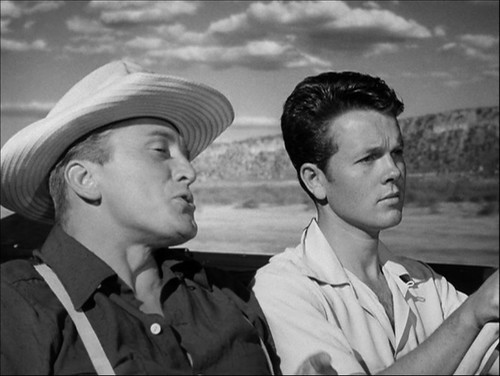
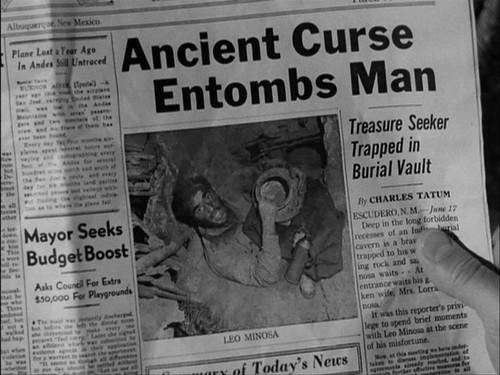


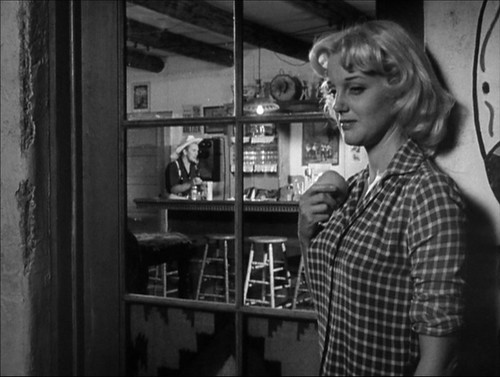
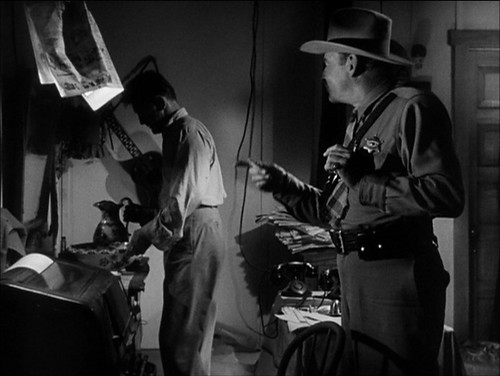
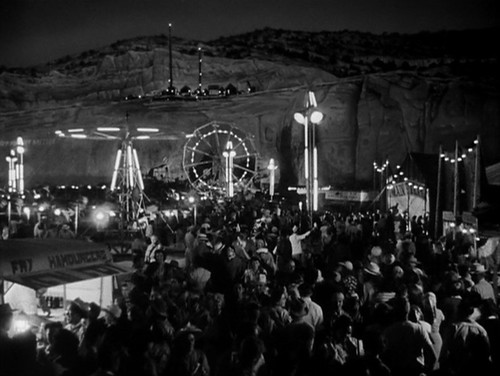
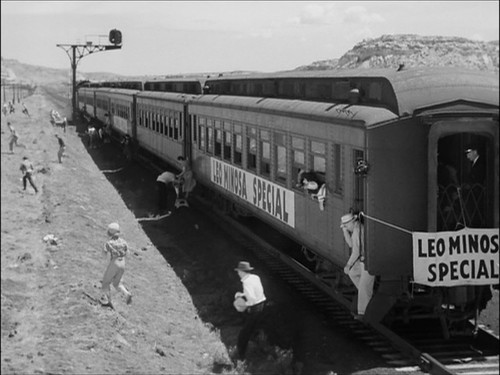
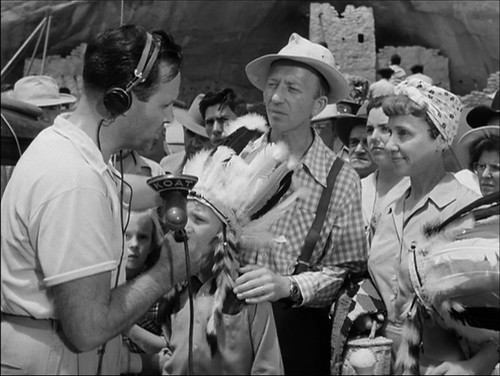
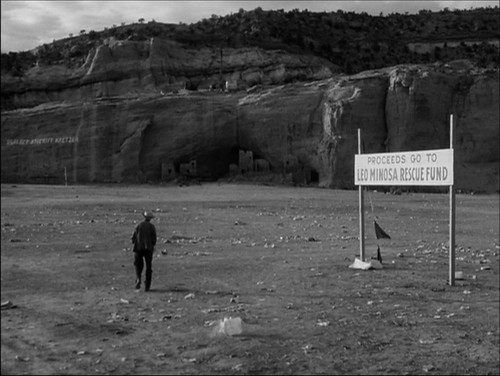
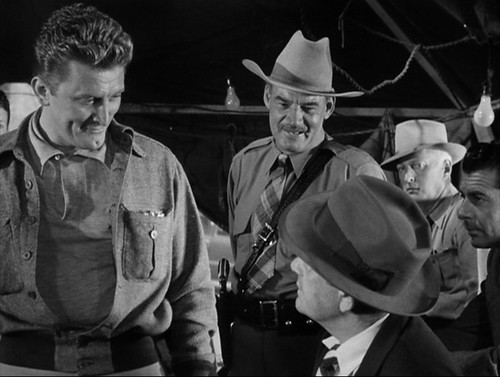



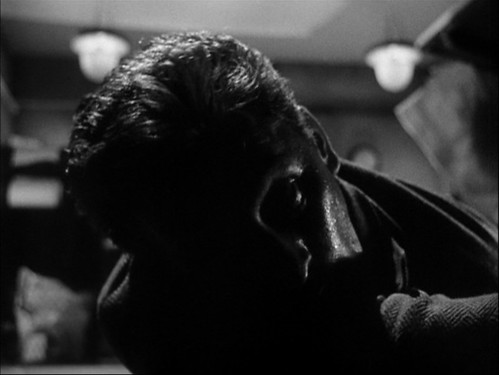
No comments:
Post a Comment